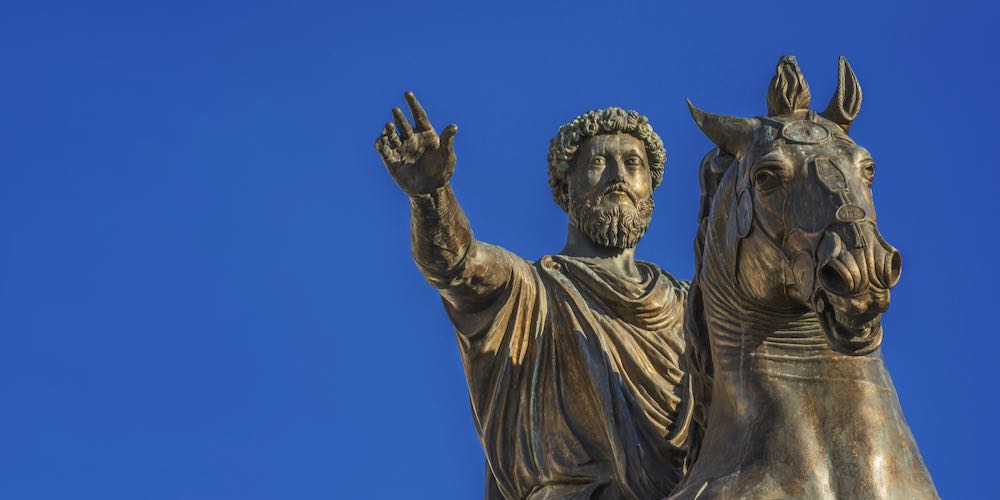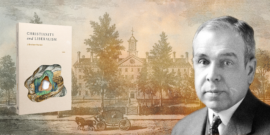There are no Greek demigods among us, but Tom Wolfe gave us heroes—the men who dare deal with the crazy consequences of our modern freedom.
Stoics in the Shining City
Ridley Scott’s 2000 masterpiece Gladiator stands as one of the most important films of the 21st century, and one of the greatest action movies in cinematic history. Replete with exciting battle scenes and gladiatorial contests, the film dazzled audiences and helped revive the “sword and sandal” genre for the post-millennial era. The film was not merely spectacle, however. There were several scenes in the film in which characters philosophized on the meaning of life, giving many viewers their first exposure to the pagan Roman philosophy par excellence: Stoicism.
Stoicism seemed out of place in 2000, the year in which an Evangelical Christian, George W. Bush, would take the reins of the White House. Much of America was swept up in the revival of both Evangelical Protestantism and a new form of conservative Catholicism invigorated by the papacy of Pope John Paul II. The alliance of Catholics and Evangelicals (and conservative Jews) together was largely powered by the philosophy of St. Thomas Aquinas, whose teaching on natural law and virtue informed this deeply religious neo-conservative movement. This alliance, as well as its philosophical underpinnings, has continued to endure; however, it has had to compete with a host of new philosophies as the culture and political landscape shift.
Twenty-three years have passed since the release of Gladiator, and the political and religious landscape of the United States has dramatically changed. Church membership and attendance have declined, as has the political power of Christians (Dobbs v Jackson being a notable exception). Some Millennials and members of Generation Z or “Zoomers” turn to a host of self-help gurus, pagan shamans, and alternative philosophies—among them the stoicism of Gladiator. There are innumerable social media accounts and videos teaching the values of Stoicism, a philosophy, it is claimed, which provides much of the intellectual content of Christianity without the mystical elements and strict personal morality.
In concert with the revival of stoicism, Regnery Books has re-released a collection of Stoic writings—including Marcus Aurelius’s Meditations. However, in addition to Aurelius (and Epictetus), Regnery’s new edition has a selection of letters from Seneca, which have been translated by Spencer Klavan, who provides an informative forward to the book on the history of Stoicism.
While Marcus Aurelius was an emperor who reinvigorated Rome, Epictetus was a slave who lived a harsh life. However, both come to very similar conclusions on the way to navigate the difficulties of life.
Stoicism has traditionally been the great rival of Epicureanism. While Epicureanism seems to question human free will and argue for a life of material pleasure, Stoicism offers a life of self-discipline and resignation in hope of an eternal reward. As Klavan argues, Stoicism further mirrors elements of Christianity, which, over time, replaced Stoicism as the intellectual underpinning of the Roman Empire. While Plato and Aristotle argued for a firm divide between the aristocratic class and the commoners, Klavan importantly notes that Stoicism (like Christianity) emphasizes the shared humanity among disparate people. The Stoics further held that the universe was ordered by God and that all the events that occurred in the life of humans were marked by divine providence—Stoicism, Klavan further argues, is not simply an ethical system but a philosophy of physics as well. For Marcus Aurelius, humans were faced with a choice between “providence or atoms”; either life has meaning or it doesn’t. Such a theme would later be debated by Blaise Pascal as well as the existentialists in the nineteenth and twentieth centuries. Klavan notes that the Stoic concept of oikeiosis, or the brotherhood among all humans, is especially apropos in our own age in which there is a great rebellion against liberal humanism and many are embracing racialism and various gender identities to craft an exclusionary identity. Klavan does not suggest that the Stoic Hierocles argued that kinship proceeds in circles from an individual, stretching from family to the entire universe (St. Thomas Aquinas actually presents a similar idea). Thus, Stoicism does not necessarily preclude the importance of ethnic and national identity.
The meat and potatoes of the book are the selections from the great Stoic philosophers themselves. Marcus Aurelius is most famous for his collection of aphoristic Meditations as well as his ability to revive the failing Roman Empire. Throughout the twelve books of the Meditations, Aurelius counsels himself and his readers to exercise strictness with themselves and patience with others. Like a hardboiled detective novel, Marcus Aurelius recognizes human weakness, but he balances this hardboiled realism with an emphasis on sympathy for a fellow man’s weakness. Marcus Aurelius further emphasizes the importance of resolve and firmness of will, joined together with humility and the willingness to learn from others. The goal of Aurelius’s Stoicism, like that of many philosophies—even the notorious Epicureanism—is to reach a state of emotional and mental calm. Aurelius argues for achieving such calm through right moral behavior, simplicity, and trust in Divine Providence.
Gateway to the Stoics also includes Epictetus’s Enchiridion or Manual. While Marcus Aurelius was an emperor who reinvigorated Rome, Epictetus was a slave who lived a harsh life. However, both come to very similar conclusions on the way to navigate the difficulties of life, demonstrating the universal appeal of elements of Stoicism. Like Marcus Aurelius, Epictetus emphasizes detachment from the desire to control the exterior world and argues for self-control. He further emphasizes the importance of detachment from things of the world (including, harshly, one’s own family).
For the Stoics, as for many ancient philosophers, philosophy was not simply an intellectual exercise; it was a way of life.
As contemporary Stoic commentators note, Stoicism does not necessarily deny the importance of family but rather presents a sober and rational assessment of the reality that everything in the material world is mutable. Like the Biblical Job, the Stoics were well aware that everything that one has can be taken away. Epictetus also humorously notes that the philosopher is often the object of ridicule; however, he knew that persistence in right moral action would ultimately win over many skeptics of philosophy. This point is very important: for the Stoics, as for many ancient philosophers, philosophy was not simply an intellectual exercise; it was a way of life.
Yet Stoicism was not enough to save the Roman Empire, and it is not enough to save America. The Roman ideal of Stoicism was able to fortify troops for multi-year-long deployments in the far-flung parts of the empire. However, the Roman heart and mind ultimately longed for something more, and Christianity was able to provide this. American Christianity has suffered setbacks in the twenty-first century. As the War on Terror dragged on and became increasingly unpopular, Christianity became increasingly associated with neo-conservatism as well as with the establishment Republican Party, which had fallen out of favor with many—especially the young. Eight years of Barack Obama were enough to capture some Evangelicals, who became, among other things, “post-Evangelical,” as well as some formerly conservative Catholics who became “LeftCaths” or Catholics who claim to be doctrinally orthodox but politically progressive.
Stoicism does provide an intellectually potent alternative to the selfish hedonism of the Zoomer generation. While arguing for self-control and discipline, it makes allowance for human foibles and does not consider some sexual transgressions to be immoral. This is one of the biggest differences between Stoicism and Christianity: the concept of sin. Christianity calls its adherents to a process of perfection that leads to a clean heart and mind. Stoicism is a hard-edged philosophia vitae that calls its adherents to a life of sober discipline, resignation to providence, and recognition of a common humanity. It is thus appealing to Zoomers tired of the seeming effeminacy and “bourgeois” life of some Christians. Humans, however, need something more than intellectual food. We need mystical experience, ritual, and the power of an encounter with a God who not only knows us but loves us.



